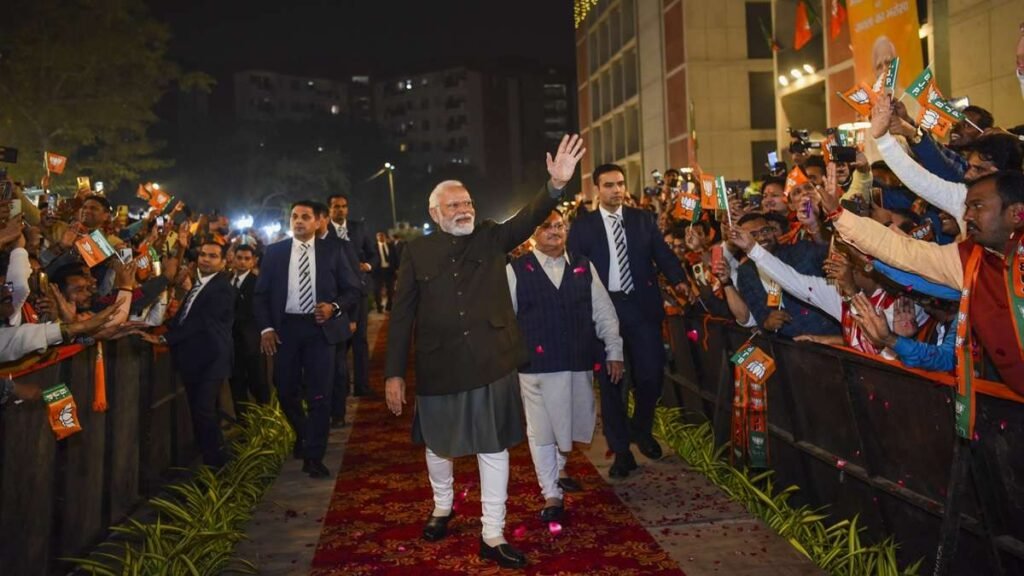
Now that the state assembly elections’ results of the five states are out wide open, the message is loud and clear, what Indian voters want, Stability, Performance & Credibility. With the Bharatiya Janata Party (BJP) securing thumping victories in three major Hindi heartlands, Rajasthan, Madhya Pradesh and Chhattisgarh, the impact on India’s foreign policy is also going to be quite significant.
In these state elections, a huge 16 million Indians, the expected number of voters, gave a resounding mandate to a government that puts the national interest first. The idea that a secure country begets secure citizens, a tenet that perhaps lied in the shadows during the previous tenures of Congress led UPA governments, has now emerged as a fundamental governing principle.
Though, in the Modi government, vote bank politics in India no longer impacts India’s foreign policy and it is totally independent and inspired from the national interest only. However, for making a strong, bold and long term policy move, a government needs to have a stable and strong back at home, which is why in the field of foreign affairs; stability becomes a decisive and defining characteristic.
A stable government is way better placed to navigate and control the complex environment of international relations & networks. It is evident that the current leadership under Prime Minister Narendra Modi has been successful in providing the stability needed to manage India’s foreign policy efficiently & effectively. The contrast between a stable government with a bankable face prioritizing national interests, good governance & development for all and a vindictive leaderless opposition highlights the importance of strong leadership in shaping the nation’s global standing.
A famous saying, ‘A strong leader leads to a strong nation’ summarizes the impact of muscular leadership on diplomatic reforms, foreign affairs and the country’s image in the international arena. From the significant Vaccine Maitri, to economic reforms such as the Goods and Services Tax (GST) to initiatives such as Make in India, Atmanirbhar Bharat, Digital India PM Modi has adequately and efficiently handled a number of challenges. His leadership has been indispensable in navigating the internal and external dynamics and shown India as a responsible global player.
As India strives to become ‘Viksit Bharat’– a developed nation and global superpower by 2047, political stability becomes supreme and commanding. These state elections result signals that voters understand the need for a government with a well-defined actionable roadmap for the future, rather than one focused on short-term political gains. This perspective is substantial & determining, as India faces a series of various foreign policy challenges, including the recent US allegations of assassination attempts of Khalistani extremist Gurpatwant Singh Pannun on American soil, the ongoing Canadian allegations of another Khalistani extremist Hardeep Singh Nijjar’s killing, & China and Pakistan’s hostility.
The Indo-Pacific region, a key strategic area of focus, needs a delicate balance to maintain steadiness. Consistent with the development, credibility and stability narrative, recent state election results augur brilliantly for India’s foreign policy goals. Furthermore, sources also claim that China may try to influence India’s upcoming general elections, 2024 due to various restrictions imposed on Chinese funding under the Modi government which also underscore the geopolitical significance of India’s domestic political environment.
Economic & trade interests also play a dominant & cardinal role in shaping a nation’s foreign policy. Reports from institutions such as Morgan Stanley suggest that a negative election result (probability of a coalition government) in 2024 could result in a 30% drop in Indian stock markets. This underscores the significance of a strong political mandate in supporting long-term reforms and policies, instilling confidence in global investors to contribute to India’s super economic growth journey.
These wins by BJP in states of Rajasthan, Madhya Pradesh and Chhattisgarh serve as mood indicators ahead of the 2024 general elections. Though these elections were fought on local issues, but one positive sign suggests that Indian voters favor a government committed to a long-term policy in line with the nation’s interests first. The Modi government’s comprehensive approach, encompassing diplomatic reforms, foreign relations, economic reforms and nation-building initiatives, has resonated with the Indian population.
Nevertheless, these state election results will surely have far-reaching implications for the nation’s foreign policy. Supporting nation-first approach over conventional politics is evidence that Indian voters understand the principal need for bold and far-sighted leadership. As India positions itself on the world stage, these state election results reinforce the importance of our foreign policy continuity, serving as a major booster for the Modi government!






It is very true but one thing that is important is that the corruption in the states by governments is impacting morale of those fighting for hindutva. A narrative is being establish that it is pseudo nationalism that is patronising corruption in BJP led states. This should actually stop.